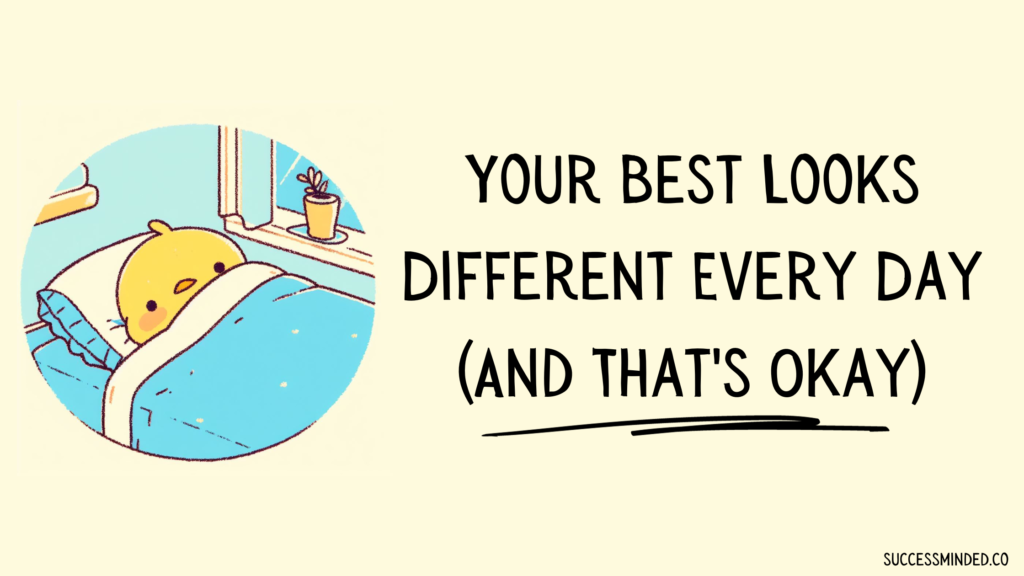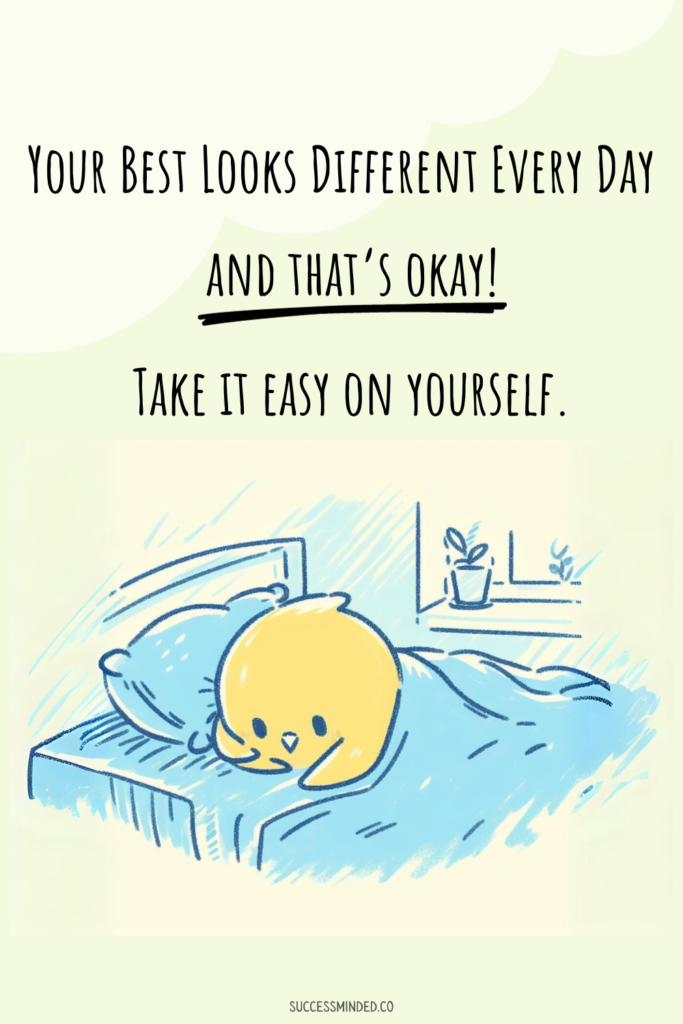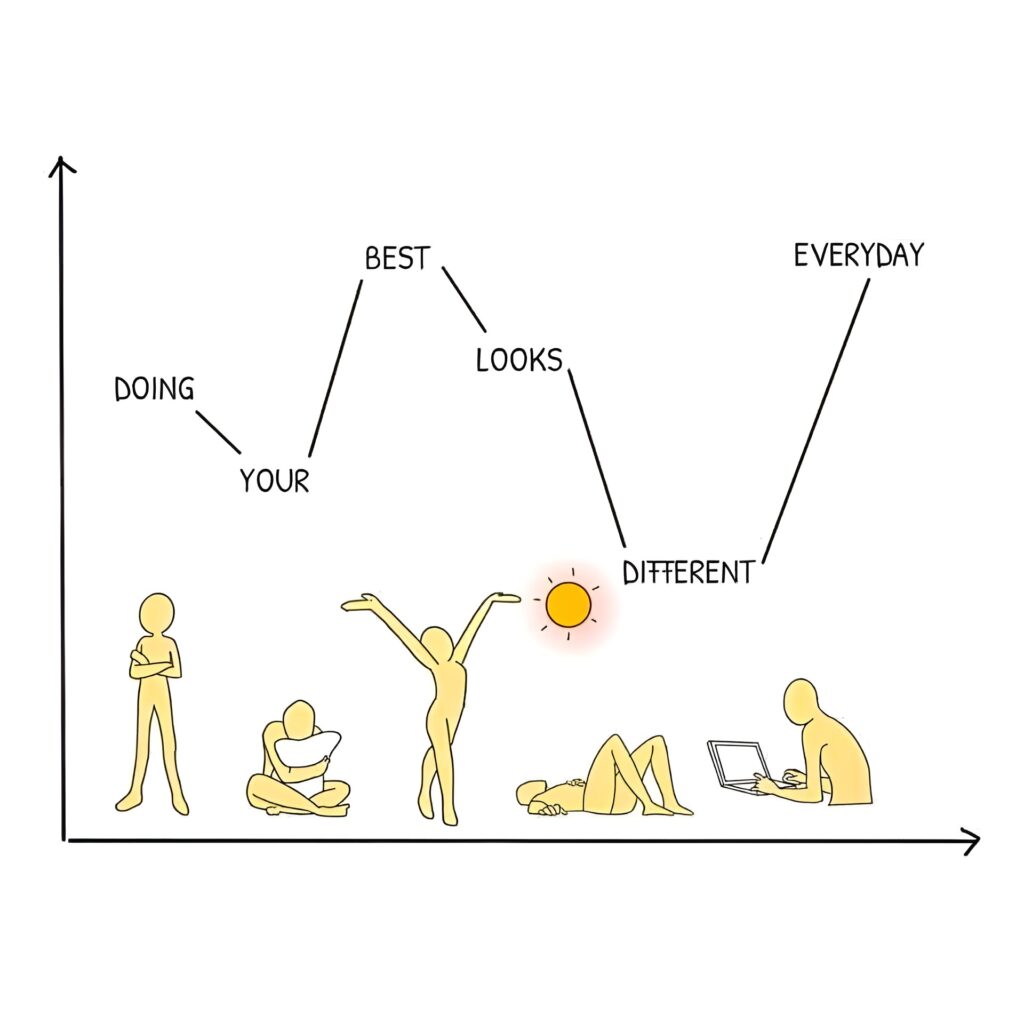We all have an image of being at our best – effortlessly knocking out tasks, heroically lifting heavy weights at the gym, and radiating charm and wit in social settings. And sure, you may hit occasional peak flow states where everything clicks. But forcing yourself to be maximally “on” day in and day out is unrealistic and unhealthy.
The truth is our physical, mental, and emotional capacities fluctuate daily based on factors like rest, stress, nutrition, and more. Having compassion for these natural ups and downs allows us to better care for ourselves overall. Your “best” output will vary day to day, and that’s perfectly fine.

Accepting Natural Highs and Lows
Imagine your energy and clarity are like a gently rolling wave. Some days, you ride at the top, feeling unstoppable. Things flow effortlessly. Other days, you slide into the trough, taking twice as much work to accomplish half as much.
Rather than fighting your low phases with frustration, accept they are a natural part of being human. Pushing unreasonably on off days will just deplete you further. Honor your changing needs.
Tuning Into Your Changing Needs
Your mind and body give you signals about what they need day to day. Are your reactions dulled from too little sleep? Is brain fog sapping your focus? Tune in and then adapt. Scale back your expectations around what you can handle accordingly.
Maybe an intense workout needs to swap for a walk in nature. Or coffee with friends takes priority over heads-down work. Let your state guide appropriate activities.
The Myth of Constant Optimal Productivity
Social media images of people always “living their best lives” perpetuate an unhealthy myth that we should all be at peak performance all the time. Reject the dangerous idea that taking breaks, having off days, or prioritizing activities unrelated to output is somehow wrong or lazy.
Humans aren’t designed to produce like robots without rest or recovery. Cut yourself slack.
The Freedom of Forgiving Yourself
When you don’t live up to your own standards, frustration is understandable. But beating yourself up with self-criticism only worsens your state. Offer compassion instead. Everyone needs an off day sometimes.
Keep perspective that one low day does not define you. Refocus with self-care.
Knowing When to Rest and Reset
Listen when your mind and body signal a temporary loss of capacity from overload or life stresses. For example:
- Mental fatigue making focus and motivation tough
- Physical symptoms like headaches, stomach issues
- Quick temper, heightened anxiety or sadness
Take these cues seriously and actively rest and reset. Lighten responsibilities, take a nature break, say no to optional tasks. You’ll recoup faster if you’re attentive to your needs.
Pushing Through When You Can vs. Cutting Yourself Slack

A dead, tired runner can sometimes power through the final mile by sheer will. Similarly, you can often still accomplish something on low days, just with radical self-compassion. Do what you reasonably can, then let it go.
But discern when you’re truly depleted and gently halt for the day. Requiring excellence amid exhaustion benefits no one. Give yourself permission to take a break.
Comparing Mindfully, Not Critically
On low days, it’s easy to negatively compare yourself to others humming along at full capacity. Catch yourself when making destructive social comparisons. Instead of criticism, have perspective that you’re at different parts of natural cycles. Compare yourself only to your own baselines.
Success Can Take Many Forms
When energy is low, broaden definitions of accomplishment beyond tangible output. Simply getting to work despite fatigue, having a pleasant conversation, or taking a small step counts as a win some days.
Celebrate diverse daily successes vs rigidly measuring yourself by productivity. Progress comes in many forms.
Being Your Own Best Friend
Treat yourself as you would a dear friend who came to you exhausted and overwhelmed. You wouldn’t criticize their shortcomings that day or make them feel guilty for taking a break. You’d listen with empathy and encourage them to rest and return stronger. Grant yourself that same self-compassion.

Conclusion
To wrap up, your health, energy, and inner reserves rise and fall. Let go of rigid expectations to perform at peak capacity daily. Meet each day’s unique needs on its own terms. You can still strive and accomplish on low days, just with greater gentleness and less judgment. Your best will look different each day – embrace your changing rhythm.




Pingback: Lead by Example With These 25 Powerful Quotes – Success Minded